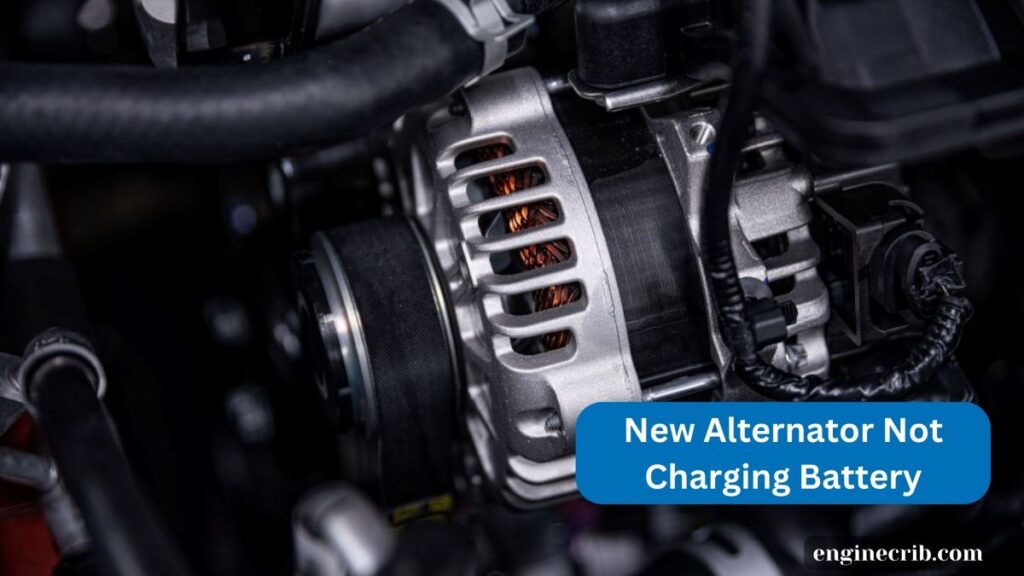Your car’s alternator is responsible for charging the battery while the engine is running, and when it’s not functioning properly, it can leave you stranded with a dead battery.
Although a new alternator is supposed to fix the problem, it’s not always guaranteed.
In this guide, we’ll explore the causes of a new alternator not charging the battery and offer solutions to help you get your car back on the road.

Table of Contents
What is an Alternator?
An alternator is an essential component in a vehicle’s charging system that converts mechanical energy from the engine into electrical energy to power the car’s electrical systems and recharge the battery.
It’s responsible for producing the electricity needed to keep the battery charged and run the car’s electrical components, such as lights, radio, and air conditioning, while the engine is running.
The alternator is typically belt-driven and consists of a rotor, stator, rectifier, and voltage regulator. It plays a crucial role in maintaining the battery’s charge and keeping the vehicle’s electrical system functioning properly.
Causes of a New Alternator Not Charging the Battery
When you install a new alternator, you expect it to work flawlessly, but sometimes that’s not the case. Here are some common causes of a new alternator not charging the battery:
1. Loose or Damaged Wires
Sometimes, the wires that connect the alternator to the battery or the rest of the electrical system can become loose or damaged during installation. This can prevent the alternator from charging the battery.
2. Faulty Voltage Regulator
The voltage regulator controls the amount of voltage that the alternator sends to the battery. If the regulator is faulty, it can prevent the alternator from charging the battery properly.
3. Bad Battery Connections
The battery cables and terminals must be clean and tight for the battery to receive a charge from the alternator. Corroded or loose connections can prevent the battery from charging.
4. Defective Alternator
While rare, it’s possible to receive a defective alternator straight from the manufacturer. This can happen due to manufacturing defects, shipping damage, or other factors.
5. Broken Serpentine Belt
The serpentine belt connects the alternator to the engine’s crankshaft; if it’s broken, the alternator won’t be able to charge the battery. A broken serpentine belt can be caused by wear and tear or a faulty belt tensioner.
6. Blown Fuse
A blown fuse can also cause the alternator not to charge the battery. In most vehicles, the alternator is connected to the battery through a fuse. If this fuse blows, it will disrupt the flow of electrical current from the alternator to the battery. This can cause the battery to drain, as it is not receiving a steady supply of power from the alternator.
Solutions to the Problem
Here are some solutions to the problem of a new alternator not charging the battery:
1. Check the Connections
Loose or corroded connections can prevent the alternator from charging the battery. Check the battery terminals, alternator terminals, and ground connections to ensure they’re clean, tight, and free of corrosion. If necessary, clean the connections with a wire brush and tighten them securely.
2. Inspect the Alternator Belt
A loose or worn-out alternator belt can prevent the alternator from charging the battery. Inspect the belt for any signs of wear or damage, and check the tension to ensure it’s properly tightened. If necessary, replace the belt or adjust the tension.
3. Test the Voltage Regulator
The voltage regulator regulates the alternator’s output and ensures that the battery receives the correct amount of charge. Use a multimeter to test the voltage regulator, and replace it if it’s faulty.
4. Check the Alternator Diodes
The diodes in the alternator are responsible for converting the AC current produced by the alternator into DC current that can charge the battery. A faulty diode can prevent the alternator from charging the battery. Use a multimeter to test the diodes, and replace the alternator if necessary.
5. Replace the Battery
If the battery is old or damaged, it may not be able to hold a charge, even if the alternator is working correctly. Replace the battery if it’s more than a few years old or if it shows signs of damage or corrosion.
6. Seek Professional Help
If you’re not comfortable diagnosing and fixing the problem yourself, seek professional help from a mechanic. They can diagnose the issue and provide the necessary repairs or replacements.
Why Is My Battery Not Charging With New Alternator?
If your battery is not charging with a new alternator, it could be that the diodes have burnout, which will, in turn, disrupt the power flow.
Can a Fuse Cause Alternator Not to Charge?
Yes, a blown fuse can cause an alternator not to charge. The alternator needs a consistent flow of electricity to function correctly and charge the battery. If the fuse that powers the alternator or the charging system is blown, the flow of electricity will be disrupted, and the alternator won’t charge the battery.
Can a New Alternator Drain a Battery?
A new alternator should not drain a battery. However, there are some instances where a new alternator can appear to be draining a battery. One possibility is that the alternator was improperly installed, causing a short circuit that drains the battery. Also, another potential cause is a faulty voltage regulator, which can cause the alternator to produce excessive voltage, leading to battery drain.
Read: Vinegar Smells in Car [How to Get Rid of It]
Conclusion
Several factors can cause A new alternator not to charge the battery. Troubleshooting the charging system requires a systematic approach, which involves checking the battery, alternator, connections, and other components. If the alternator is found to be faulty, replacing it with a high-quality unit is essential to prevent further issues.